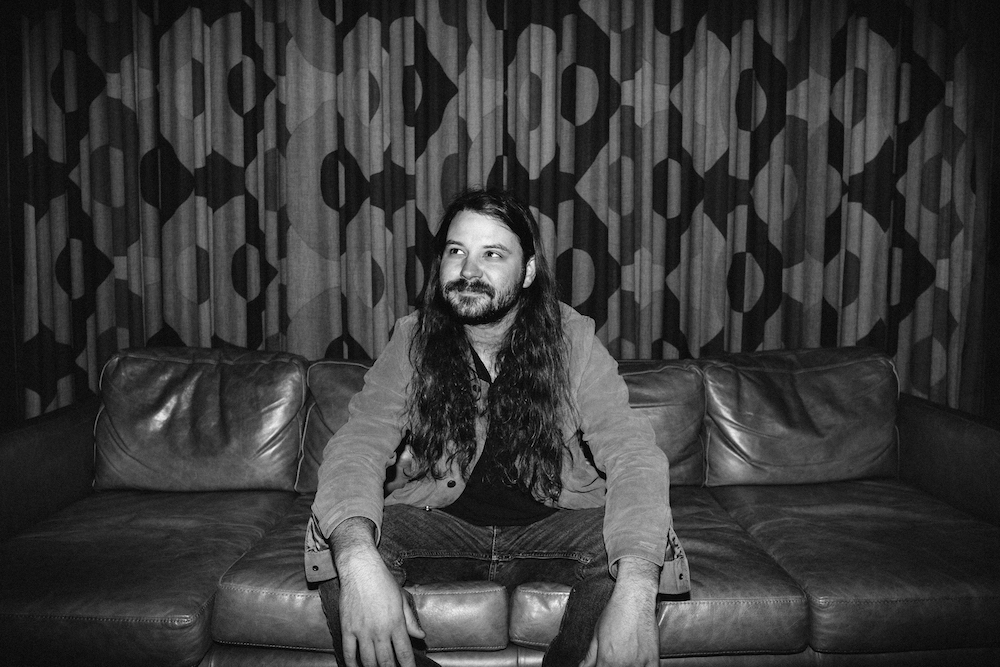
Brent Cobb couldn’t be happier with the state of country music. On his new album, Southern Star (Ol’ Buddy/Thirty Tigers), Cobb takes stock of Nashville’s 18-year transformation at the hands of Shooter Jennings, the Steel Woods, Sturgill Simpson and other outlaw-country acts. “What took the world so long to catch it?/To us, it was nothin’ new,” he sings on “When Country Came Back To Town.”
The song is the lengthiest and most far-reaching on Cobb’s sixth album, a lovingly assembled, self-produced affair immersed in the low-key lore of the celebrated singer/songwriter’s rural Georgia upbringing. The album was recorded with a full slate of Peach State musicians at Macon’s legendary Capricorn Sound Studios, once a go-to spot for such acts as the Allman Brothers, Elvin Bishop and the Charlie Daniels Band.
Raised in the southwest Georgia town of Ellaville, Cobb is related to Grammy-winning producer Dave Cobb, who was enthused enough by his cousin’s demos to fly him to Los Angeles to record his 2006 debut, No Place Left To Leave. Cobb wouldn’t make another album of his own for another 10 years, keeping busy in Nashville writing songs for Luke Bryan, Miranda Lambert, Keith Urban, Kenny Chesney, the Steel Woods, Whiskey Myers and many others. When his sophomore release, Shine On Rainy Day, finally emerged in 2016, it made an impact, reaching number 17 on Billboard’s Top County Albums chart and earning an Grammy nomination for Best Americana Album.
Two years later, after more than a decade in Nashville, Cobb returned in his native Georgia, where he and his wife are raising a daughter and a son. We caught up with him there as he was prepping for a lengthy string of live dates that begins this week.
So you found your way home after quite a bit of time in Nashville. What fueled that decision?
We relocated back down here to have a little extra support from my family. With everything I’ve ever written, I’ve always been astutely aware of the present moment and trying to appreciate it … Or, if I’m not appreciating it, then at least trying to be aware that I’m living it. It’s all so fleeting, and that fact has only gotten more potent since having kids. It’s so nice to do it like Otis Redding did it in the ’60s: Get up at home, throw out some corn for the geese, hop in the van or bus, do a three-week run, and come home. And when I’m home, it’s home home—in Georgia.
Speaking of Nashville, things have certainly changed there.
I think we have the internet to thank for helping that along. I can remember first going to L.A. in ’05 and (Jason) Rowdy (Cope) of the Steel Woods picking me up. I stayed at his house for a year and a half, going back and forth. Rowdy’s number-one rule: The songs gotta be fuckin’ great; if you’ve got great songs, you can’t fuck it up. His second rule: Treat every fan like family, and don’t be an asshole to anybody. He lived it—and I feel the same way. I went to the studio where Rowdy and Shooter (Jennings) were recording the Electric Rodeo album. Dave (Cobb) was behind the board, and he pulled up this new thing on the computer called MySpace. I didn’t even have a cell phone at the time. [Laughs] I remember seeing the MySpace music charts full of all these people nobody had ever heard of. Now, there doesn’t have to be a middle guy. You can take the music straight to the people. It’s anything goes—and it’s the reason I don’t have to be in Nashville.
What were you trying to do with Southern Star that’s different from what you’ve done in the past?
I don’t know that I was trying to do anything different, necessarily—except continuing to home in on the core of what I do and who I am. I try to be universally personal. My story isn’t all that different from other people’s experiences. Everybody is living the same life in different ways. This is a bit of an abstract example but … Eminem. Everybody knows his story, and all the characters in his life are part of what everyone’s buying. He doesn’t have to fake anything because it’s all true.
How would you describe the sound of the new album?
I’ve been calling it Southern eclectic storytelling. There’d be no music as we know it without the American South. It’s beautiful, it’s interesting, it’s conflicted. In Georgia, you have Otis Redding, who was raised in Macon. Little Richard was from the same damn town. You had Percy Sledge coming through there all the time. Then you had James Brown right down the road. Then to top it off, Ray Charles was from Albany, Ga. Just those people right there are a lot of the foundation of American music. That’s rock ’n’ roll, soul and country—because they were country, too. Otis was raising hogs and chickens, and he was riding his horses. To connect the dots in one last way: “(Sittin’ On) The Dock Of The Bay” was released posthumously, and I’ve heard his daughter talk about how he’d said it was different than anything he’d done before. Instead of writing about women and relationships, he was writing about his emotions and thoughts. It’s as personal as it gets.
How does that inspire you as a songwriter?
When I’m hittin’ a wall, I think, “What would Otis Redding say if we were working together on a song right now?” I do the same thing with Ronnie Van Zant, because I relate to him a lot, too. When I’m writing, I think, “What do I want to say? Fuck what everybody else wants to hear. What’s in my soul that wants to come out?”
—Hobart Rowland





